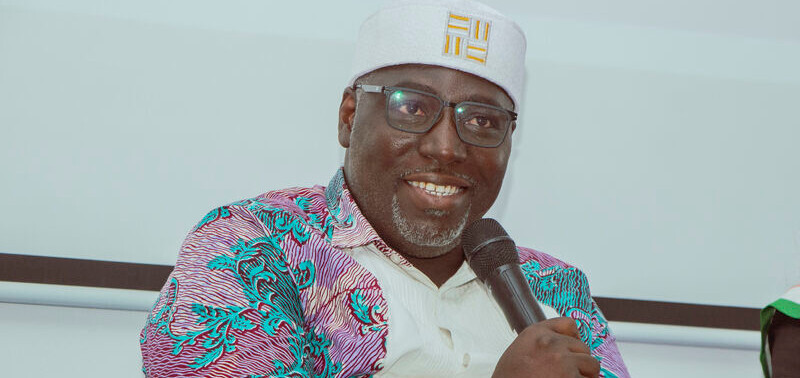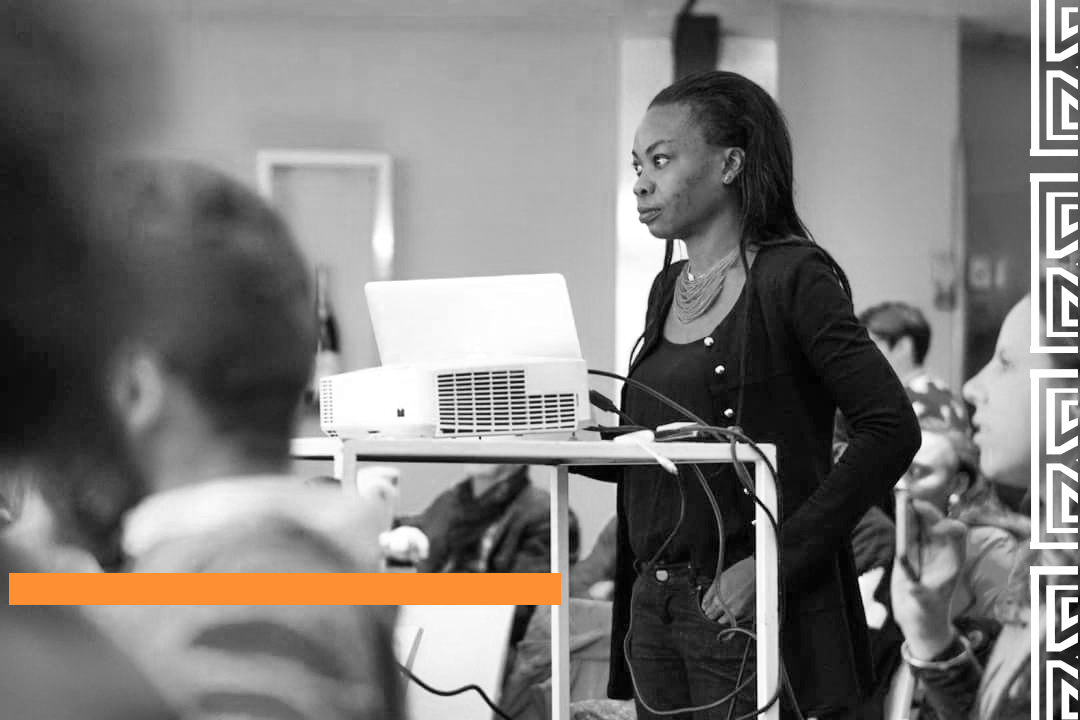Cyriac GBOGOU: “I don't have the BAC. I say this to make young people understand that failure is not inevitable".

Cyriac GBOGOU is one of Côte d'Ivoire's key players in the digital, entrepreneurial and cultural worlds, and one of the country's 50 faces of tech. Also co-founder of O' Village, which he describes as a space for social transformation, Cyriac GBOGOU has made his commitment to promoting Africa's heritage and resources a priesthood. Inspire Afrika Magazine spoke to the man nicknamed the “village chief”.
Inspire Afrika Magazine: Who is Cyriac Gbogou?
Cyriac GBOGOU: Cyriac Gbogou is a young African citizen living in Côte d'Ivoire, co-founder of a space for innovation, co-working and social transformation called O'Village. I'm also a blogger in my spare time. I'm a computer science engineer with a telecoms option. I don't have a high school diploma. I say this to help young people understand that failure is not inevitable, as long as you understand why you failed and try to move forward.
I.A.M: Why don't you claim any nationality?
C.G : I'm African because I feel at home in all African countries. I returned to Côte d'Ivoire in 2001 after spending my entire childhood outside the country. It's true, I have Ivorian nationality, but to say I'm only Ivorian is restrictive. I feel more African. If an African country needs me, I'm there.
I.A.M: How did the idea of creating O'Village come about?
C.G: It all goes back to 2011, when I met Florent Youzan, a senior member of our team who is also a great activist in all things free software. With him, during a trip to Burkina Faso, we discovered a lot of things that we wanted to share with young people here in Côte d'Ivoire. On our return from the trip, we organized the first co-working mornings, which were mornings of collaboration and innovation, with everyone sharing their knowledge on various subjects. At the end of these mornings, which were rather mobile, we said to ourselves that we needed a space of our own, where we could be located. We spoke to a structure that made premises available to us. Since 2014, O'Village has had a headquarters located in Zone 4 - in the commune of Marcory.
I.A.M: What is the vocation of this space?
C.G: It's a space for social transformation. We're interested in all kinds of profiles. We don't make selections because we don't know where an innovation might come from. We believe that everyone has the capacity to bring about change. We accept everyone - children, young people and adults. Among the young people we receive are students at the end of their studies who don't know what to do next. We help them with training courses designed to help them become entrepreneurs. As Florent likes to say: “Every African problem is a business idea”. In other words, today, everyone is capable of solving the problem they face, and that's what innovation is all about. We offer training, coaching and business and project acceleration.
I.A.M: You might think that you're more focused on digital at O'Village?
C.G: We're not digital-oriented. As I said earlier, we're interested in all sectors. From literature to agriculture to education. We attach particular importance to the development of children, whom we want to teach to use ICT as early as possible. O'Village is open to everyone. It's true that we use technology to boost our activities, but we're not just focused on digital.
I.A.M: Why did you choose the name O'Village?
C.G : We wanted something atypical that spoke to us, and at the time all similar spaces had the ending “lab”. We told ourselves that our strength lay in our source. For us, this source is the village, the community that we wanted to highlight. Africa is rich in culture and history, but unfortunately we don't emphasize this aspect enough.
I.A.M: You're very committed to African youth. Why do you go to so much trouble?
C.G: I work hard for young people for the simple reason that I was young once. When I was going through a teenage crisis, I didn't have a mentor to guide me or show me the right way. And when I see what our young brothers are going through today, I say to myself that if we don't guide them, if we don't give them advice, if we don't put them on the right path, they'll go adrift. It's said that they are the future of our countries, and for O'Village it's like a priesthood to reach out to these young people and share with them our life experience, our actions, our achievements, so that they can draw from our source. Our elders have traced the furrows in which we walk, and it goes without saying that we in turn show the way to the young.
I.A.M: Do you think that your message is being heard, that these young people are following the path you're showing them?
C.G: If one or two people understand and follow the path we're showing them, we feel that the message has got through. Because one person can in turn touch many others, transforming them into solution-bearers and agents of change. We place great emphasis on following up our actions to ensure that they have a positive impact on the community. This has been the case since the creation of O'Village, and it's something we're very proud of.
I.A.M: What has impressed you most about this adventure?
C.G: Seeing all these young people, whatever their ethnic background or social class, come to O'Village not knowing what it is, and after a few years or a few months for some, become agents of change. Seeing people who weren't working yesterday and now have a job; or people who didn't know what to do with their lives and now show the way to others. It's these inspiring examples of life that we'd like to continue showing.
I.A.M: You're also very keen on promoting Africa's cultural and tourist heritage. Is there a particular motivation behind this?
C.G: Yes, Africa is rich, as I'll never stop saying. Unfortunately, we neglect this wealth, and it's other people who come and show it to us. For me, this has to stop. As Africans, it's up to us to show the world our cultural heritage. If we don't, those who do will do it badly. I see in some foreign media that Yamoussoukro is in the north of Côte d'Ivoire, whereas it's in the center of the country. It's up to us to promote our continent, otherwise nobody else will do it for us.
I.A.M: Cyriac Gbogou and reading, what's the story?
C.G: I think I've always lived with literature. Because when I was younger, at Christmas I used to ask my father for comics; Tintin, Scrooge or the Journal de Mickey to which I subscribed. This reading has more or less followed me to this day. I belong to a collective of reading enthusiasts called “Abidjan lit”, of which I'm the only man among three ladies. The idea is to promote African literature, which is very rich. When you hear people say “if you want to hide something from a black person, put it in a book”, it hurts. But it's a certain reality. I think we need to put reading back at the heart of our education. In our homes, it's the dishes that we find in the bookcases instead of books or encyclopedias. Does this mean we're more hungry than eager to learn? The debate remains open.
I.A.M: What do you think of the digital world in Côte d'Ivoire?
C.G: I think the digital world in Côte d'Ivoire has come a long way. Today, everyone knows what it is to be a blogger, whereas before, bloggers were confused with cybercriminals. But this perception has evolved, and today's digital players have this opportunity. Let them take advantage of it, train more and launch themselves, because there's room for everyone. There's no competition, it's training that makes the difference. With the Internet, we're lucky to have the world at our fingertips. There are massive online courses called MOOCs, which enable an Ivorian in Abidjan to get the same qualifications as a Harvard student, thanks to his or her Internet connection. By staying here, you save on the additional costs of training. You just have to be assiduous and have skills that will be useful in your professional life.
I.A.M: What is your message to the youth of Africa?
C.G: Whatever the circumstances or difficulties, never give up. You don't know who's counting on you. You are a solution to a family problem, a community problem, a problem in your country, or even on your continent or in the world. You may not realize it. There's a passage in the Bible I particularly like, Romans 8 verse 19: “Creation waits with eager longing for the sons of God to manifest themselves”. It's time for us to manifest ourselves, because somewhere people need a solution, and that solution won't come from someone else, it'll come from me, from you, from us. Together we can solve problems. Our environment can push us to discouragement, but let's pull ourselves together and move forward.
Written by Emily TAPE



0 comments
Log in with your account or sign up to add your comment.